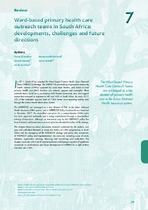Ward-based primary health care outreach teams in South Africa: developments, challenges and future directions
Date
2018Author
Schneider, Helen
Besada, Donela
Sanders, David
Daviaud, Emmanuelle
Rohde, Sarah
Metadata
Show full item recordAbstract
In 2011, South Africa adopted the Ward-based Primary Health Care Outreach
Team (WBPHCOT) Strategy. The WBPHCOTs are made up of generalist community
health workers (CHWs) supported by nurse team leaders, and linked to local
primary health care (PHC) facilities (via referral, support and oversight). These
outreach teams build on a pre-existing NGO-based community care and support
system that emerged in response to HIV and AIDS in South Africa. By early 2017,
42% of the estimated required total of 7 800 teams were reporting activity data
through the District Health Information System.
The WBPHCOTs are envisaged as a key element of PHC in the future National
Health Insurance (NHI) system, and a WBPHCOT Policy Framework was launched
in December 2017. An accredited curriculum for a comprehensive CHW cadre
has been approved nationally and is being implemented through a decentralised
training infrastructure. Although an investment case for the WBPHCOT policy has
been finalised, additional resources have yet to be allocated for rollout of the strategy.
This chapter draws on policy documents, research conducted by the authors, and
grey and published literature to recap the history of CHW programmes in South
Africa and the emergence of the WBPHCOT strategy and policy. Key dimensions
of WBPHCOT policy and implementation are reviewed, including scope of work,
selection, supervision, training, financing and monitoring and evaluation. The
chapter concludes with a set of recommendations addressing a number of significant
constraints on performance and future development of WBPHCOTs in light of their
intended role in NHI.

